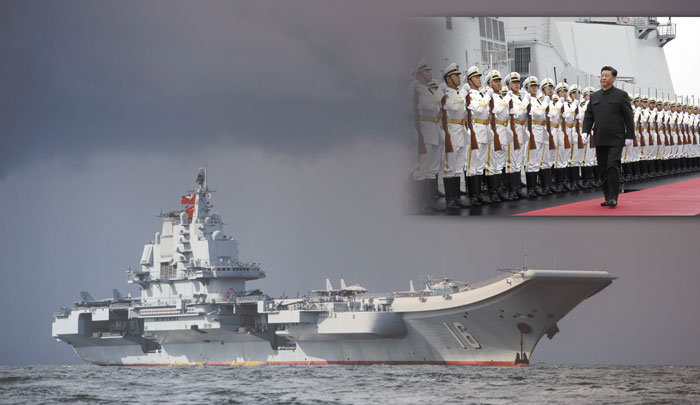China: Transición de un poder continental a un poder marítimo
Contenido principal del artículo
Resumen
La presente investigación analiza el proceso de transición en marcha, mediante el cual el gigante asiático pretende convertirse en un poder marítimo, considerando su estatus actual de potencia continental debido a su incomparable crecimiento económico, tecnológico y militar durante las últimas tres décadas. En ese sentido, busca asegurar sus líneas de comunicaciones para alimentar su omnívora producción industrial y, a la vez, proyectar su influencia a escala global. Para ello será necesario describir teorías geopolíticas clásicas como las del Heartland, el Rimland y el Poder Naval, para posteriormente contraponerlas en el escenario geopolítico regional de Eurasia, fuertemente influenciado por los Estados Unidos de América, de tal forma que nos permita entender el comportamiento e intenciones de la China para alcanzar el estatus de potencia marítima.
This research analyzes the ongoing transition process through the Asiatic giant pretends to become a maritime power considering its current continental power status due to its remarkable economic, technological, and military growing during the last three decades. Likewise, China seeks to ensure main lines of communications, which allows to feed its omnivorous industrial manufacturing while projecting its influence globally. Therefore, it will be necessary to describe classical geopolitical theories such as Heartland, Rimland, and Sea Power to overlap them with the Eurasia regional scenario, strongly influenced by the U.S. in order to understand the China’s behavior and intentions to reach the maritime power status.
Detalles del artículo

Esta obra está bajo una licencia internacional Creative Commons Atribución 4.0.
Todos los contenidos publicados son de acceso abierto (open access), con pleno reconocimiento a los autores sobre su obra. Para su publicación, los autores aceptan ceder los derechos de publicación en favor de la Escuela Superior Conjunta de las Fuerzas Armadas y la revista Pensamiento Conjunto, de acuerdo con los términos de la licencia Creative Commons: CC BY 4.0 license.
Por lo tanto, los autores y también los lectores pueden copiar y difundir el artículo en la versión final publicada en línea por la revista Pensamiento Conjunto, siempre que se reconozca e identifique al autor (o autores) del artículo, no se haga uso comercial del artículo final publicado, ni se trate de obras derivadas o versiones modificadas.
© 2019. This work is licensed under a CC BY 4.0 license.
Citas
Clinton, Hillary. 2011. “America’s Pacific Century” Foreign Policy https://foreignpolicy.com/2011/10/11/americas-pacific-century/#sthash.BIgjtHDw.dpbs (Octubre 23, 2020)
Dyer, G. 2014. The Contest of the Century New York: First Vantage Book
Gaddis, John. 2005. Strategic Containment. New York, NY: Oxford U. Press
Gompert, David. 2013. “Regional Maritime Security” In Sea Power and American Interests in the Western Pacific. RAND Corporation http://www.jstor.org/stable/10.7249/j.ctt2tt8zr.13 (Octubre 10, 2020)
Holmes, James and Yoshihara, Toshi. 2005. “Command of the Sea with Chinese Characteristics” Orbis (Fall)
Hsien Loong, Lee. 2020. “The Endangered Asian Century: America, China, and the Perils of Confrontation” Foreign Affairs http://www.foreignaffairs.com/articles/asia/2020-06-04/lee-hsien-loong-endangered-asian-century. (Agosto 05, 2020)
Jennings, Ralph. 2022. “China’s Economy Could Overtake US Economy by 2030” Voice of America, 4 Jan 2022 https://www.voanews.com/a/chinas-economy-could-overtake-us-economy-by-2030/6380892.html (Agosto 30, 2022)
Kaplan, Robert. 2010. “The Geography of Chinese Power: How Far Can Beijing Reach on Land and at Sea? Foreign Affairs 89(3): 22-41
Kaplan, Robert. 2011. “The South China Sea is the Future Conflict” Foreign Policy 188: 76-85
Kaplan, Robert. 2013. The Revenge of Geography: what the map tells us about coming conflicts and the battle against fate New York, NY: Random House Trade Paperbacks
Kim, Jihyun. 2015. “Territorial Dispute in the South China Sea: Implications for Security in Asia and Beyond” Strategic Studies Quarterly 9(2): 107-141
Li, Mingjiang. 2010. “Reconciling Assertiveness and Cooperation? China’s Changing Approach to the South China Sea Dispute” Security Challenge 6(2): 49-68
Mackinder, Harold. 1904. “The Geographical pivot of history” Geographical Journal 24(4): 421-437
Mackinder, Harold. 1944. Democratic Ideals and Reality: A Study in the Politics of Reconstruction Suffolk: Pinguin Books
Mahan, Alfred. 1890. The Influence of Sea Power Upon History, 1660-1783 Boston: Little, Brown
Malik, H.Y. 2012. “Strategic importance of Gwadar port” Journal of Political Studies 19(2)
McDevitt, Michael. 2015. “The South China Sea: Island Building and Evolving U.S. Policy” American Foreign Policy Interests 37(5): 253-263
Mearsheimer, John. 2014. The Tragedy of Great Power Politics New York, NY: Norton
Meinig, Donald. 1956. “Heartland and Rimland in Eurasian History” The Western Political Quarterly 9(3): 553-569
Office of Secretary of Defense. 2013. “Annual Report to Congress: Military and Security Developments Involving the People’s Republic of China” Retrieved from http://www.defense.gov/pubs/2013_China_report_final.pdf. (Agosto 5, 2020).
Office of the Secretary of Defense. 2020. “Annual Report to Congress: Military and Security Developments Involving the People’s Republic of China” https://media.defense.gov/2020/Sep/01/2002488689/-1/-1/1/2020-DOD-CHINA-MILITARY-POWER-REPORT-FINAL.PDF (Octubre 20, 2020)
Organización Mundial del Comercio. 2019. “Examen Estadístico del Comercio Mundial” https://www.google.com/search?q=Organizacion+Mundial+del+Comercio.+2019.+Examen+Estadistico+del+Comercio+Mundial&oq=Organizacion+Mundial+del+Comercio.+2019.+Examen+Estadistico+del+Comercio+Mundial&aqs=chrome..69i57.1286j0j4&sourceid=chrome&ie=UTF-8 (Agosto 30, 2022).
Rowan, Joshua. 2005. “The U.S.-Japan Security Alliance, ASEAN, and the South China Dispute” Asian Survey 45(3): 414-436
Shambaugh, David. 2013. China Goes Global: The Partial Power. New York. NY: Oxford University Press
Scott, David. 2019. “China’s Indo-Pacific Strategy: The Problem of Success.” The Journal of Territorial and Maritime Studies 6(2): 94-113
Singh, Teshu. 2012. “South China Sea: Emerging Security Architecture” Institute of Peace and Conflict Studies Retrieved from http://www.jstor.com/stable/respep09360 (Agosto 5, 2020)
Sloan, Geoffrey. 2018. Geopolitics, Geography and Strategy History. New York. NY: Routledge
Spykman, Nicholas. 1942. America’s Strategy in World Politics: The United States and the Balance of Power New York, NY: Harcourt Brace and Company
Spykman, Nicholas. 1948. America’s Strategy in World Politics: The United States and the Balance of Power New York, NY: Harcourt Brace and Company
Tellis, Ashley. 2007. “China’s Military Space Strategy”. Survival 49 (autumn): 41-72
Weiss, Jessica. 2019. “China’s Rise and the Future of the Global Politics.” Foreign Affairs 98(4): 92-102
Zha, Daojiong. 2001. “Security in the South China Sea” Alternatives: Global, Local, Political 26(1): 33-51

